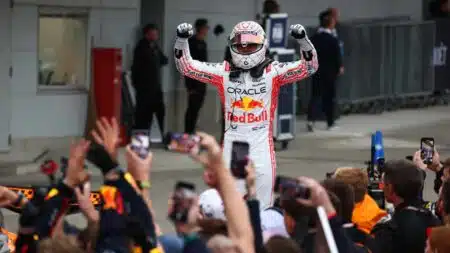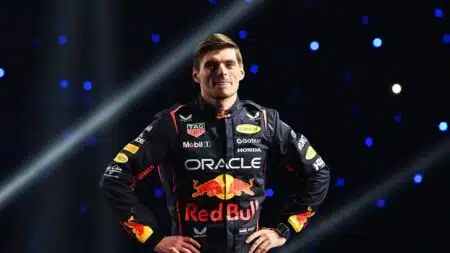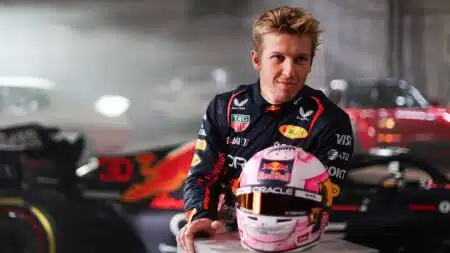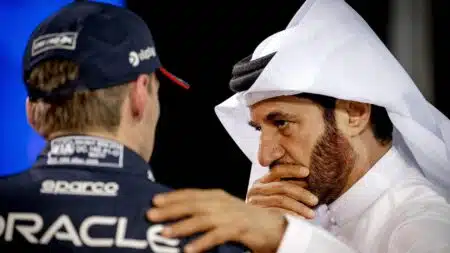
F1 snore-fest shows new cars badly needed: Up/Down Japanese GP
The 2025 Japanese GP showed a much more extreme change than next year's technical regulations is needed to make racing at classic F1 tracks interesting
Think of all the great drivers who drove all those great Ferrari prototypes and GTs that illuminated its golden age of sports car racing.
Who was the best remains open to fierce debate.
Who was the most successful is an open-and-shut case – though its contents might surprise.
Olivier Gendebien today lies in an anonymous tomb in St Rémy-de-Provence. That fits. In his racing pomp he was something of an enigma. Aristocratic in bearing and manner if not lineage – he was heir to the Solvay chemical fortune – he was reckoned aloof by some of his peers and labelled uncommunicative by many of the press.

Nürburgring, 1961
Already urbane and well educated, his wartime experiences with the Belgian Résistance – a linguistic aptitude made him a natural liaison – and later with the 5th Special Air Service airborne unit – he saw action in the Ardennes, Holland and Germany – coloured his outlook. He knew when to keep quiet and when to act with speed, judgement and bravery.
A latecomer to the sport – he spent four years from 1948 working in the forests of the Belgian Congo – he was less naïve than his eager young team-mates and more inured, though not immune, to the Machiavellian machinations at Maranello.
Enzo Ferrari ‘awarded’ him a single paragraph in his 1963 memoir My Terrible Joys – oh, the melodrama:
“Olivier Gendebien is a gentleman who never forgets that noblesse oblige and, when he is at the wheel, he translates this code of behaviour into an elegant and discerning forcefulness. He drives evenly, looks after the car and can be counted upon for clockwork precision in all those races that call for steadfastness, character and common sense.”
Ferrari, a snob at heart, felt the need then to kick away the social ladder and conclude on a poisonous barb: “One must only bear with him and let him talk when he wins, which is quite often.”

Poor Phil Hill’s paragraph includes the phrase ‘Not outstanding.’ Yet combined these two did more to establish Ferrari as a global brand than any other drivers. From the moment they first shared a Ferrari – finishing second in the 1956 Buenos Aires 1000km – they knew.
“We found out that we had similar approaches; we both had a sort of feeling for not busting up the machinery,” Hill told Motor Sport in 2002. “Olivier wasn’t that mechanically knowledgeable [though he was studying engineering when war broke out] but any time that it was necessary to understand a certain mechanical concept, he had no problem at all.”
Gendebien’s sang froid was the antidote to the bright Californian’s tendency for pre-race fretfulness and between them they supplied an esprit de corps and the strategic smarts often lacking at Ferrari.
They won twice more at Le Mans. It would have been three but for a water leak when holding a four-lap lead with four hours to go in 1959. And it might have been four had they not been split up in 1960: Gendebien won with compatriot Paul Frère; Hill’s partner Wolfgang von Trips ran out of fuel during his opening stint.

Le Mans, 1960
They also won the Sebring 12 Hours twice – between times Gendebien won it for Porsche in 1960 with Hans Herrmann – and the 1962 Nürburgring 1000km.
Hill was the quicker, Gendebien the senior partner – a happy blend free of clashing egos and ideologies.
But Gendebien was successful as co-driver to Lucien Bianchi, Luigi Musso, Chuck Daigh, Dan Gurney, von Trips, Willy Mairesse and Ricardo Rodríguez, too – and there’s a few firebrands in that list.
He won the Targa Florio thrice, scored a hat trick on the Tour de France Auto from 1957, prevailed twice at the Reims 12 Hours and was victorious in the 1957 Giro di Sicilia.
A consummate all-round sportsman – sprinting, skiing, tennis and equestrianism – only Stirling Moss could beat him at a run-and-jump start. Gendebien’s bushy-tailed agility at such moments earned him the nickname l’Ecureuil.
His fitness and concentration, too, was a match for all bar Moss’s.

Le Mans, 1962
He had honed his endurance while winning the epic Liège-Rome-Liège Rally in 1955, and re-emphasised it by setting the fastest time over the final leg, the top-gear blat from Cremona to Brescia, of the 1957 Mille Miglia.
He never would win the round-Italy classic, however, and had to settle for GT category victories in 1956 and ’57.
He drove in anger – a rare lapse of cool – on the former occasion because mechanics had failed to seal the windscreen despite his complaint at the Giro di Sicilia. It was the wettest Mille Miglia on record.
On the latter occasion he became embroiled in the politicking – another rare lapse – that led to tragedy. Having failed to convince Enzo to hand him Musso’s prototype, he met a similarly piqued team-mate in the factory’s courtyard. Though scheduled to drive a prototype, ‘Fon’ de Portago revealed that Enzo had told him Gendebien had asked for his drive – and that Gendebien would beat him in any case.
The Spanish aristo – Enzo’s told-you-so words at the Bologna control ringing in his ears – was attempting to catch the Belgian when a puncture sent him into the straining crowd, killing 10, five of them children.

de Portago
De Portago and passenger Ed Nelson also succumbed and thereafter Gendebien’s wife referred to Enzo as ‘the assassin’.
Her husband, of course, already knew what Enzo was like. And Enzo knew he knew. Over lunch he averred: “We Italians are all tricky comedians.”
Enzo also knew Gendebien’s worth. He’d spotted it when he beat works Ferraris to win the 1955 Coppa d’Oro delle Dolomiti, a three-hour mini-Miglia Mille, in a Mercedes 300SL, and nurtured it, in his own strange way, thereafter.
He was too useful to risk regularly in Formula 1.
Gendebien, of course, yearned to race in the premier category. So did Hill. But whereas the American finally got his way, the Belgian remained Ferrari’s supersub.
He took his chances well when they came. Fifth on debut in a bitsa at the 1956 Argentine GP, he had to wait until the 1958 Belgian GP for his second opportunity – and might have finished on the podium, instead of sixth, but for a pitstop for new plugs in his yellow Dino.

Monza, 1958
Again in a Dino, he finished fourth at a torrid Reims and sixth at Monza in 1959.
Aged 36, he finally took the F1 plunge and signed to drive a Yeoman Credit Racing Cooper in 1960. He finished third at Spa, scene of a grisly accident for young, eager and perhaps naïve team-mate Chris Bristow, and second behind Jack Brabham at Reims.
But in truth he’d left it too late; Hill had long ago brusquely hired a Maserati 250F to ‘make his F1 case’ to Enzo.
Relegated to a hopeless Emeryson-Maserati, Gendebien failed to qualify at Monaco in 1961.
Restored to a works Ferrari, again painted Ecurie Francorchamps’ primrose, he qualified third at high-speed Spa and led the first three laps, despite his 156 ‘Sharknose’ using an older-spec V6, and finished fourth.
Still clinging to his F1 wish, he drove a privateer Lotus 18/21 at Watkins Glen – and landed upside-down in a ditch early in practice. His car was repaired and bravely he started the race but, nursing injuries, had to hand it to UDT-Laystall team-mate Masten Gregory.

Leading at Spa, 1961
Under increasing familial pressure to retire – his wife was expecting their third child – this stylish racer chose the perfect moment to do so: after his fourth Le Mans victory.
“I have always raced purely for the sport, for the beauty of the sport,” he said. “Racing didn’t amuse so much anymore. There seemed only two choices, one to die and the other to lose.
“I decided on a third one, to stay alive.”
Click here to vote for who you want to be inducted into the Hall of Fame

The 2025 Japanese GP showed a much more extreme change than next year's technical regulations is needed to make racing at classic F1 tracks interesting

Max Verstappen looks set to be pitched into a hectic, high-stakes battle for F1 victories in 2025, between at least four teams. How will fans react if he resorts to his trademark strongman tactics?

Red Bull has a new team-mate for Max Verstappen in 2025 – punchy F1 firebrand Liam Lawson could finally be the raw racer it needs in the second seat

The 2024 F1 season was one of the wildest every seen, for on-track action and behind-the-scenes intrigue – James Elson predicts how 2025 could go even further